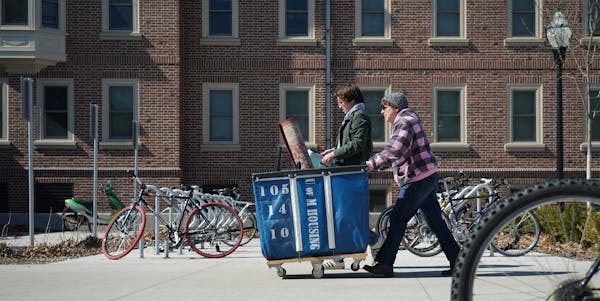The Gophers athletic department will lose at least $10 million in revenue because of the coronavirus pandemic, and up to $75 million if games are canceled through the fall, according to estimates prepared for Tuesday's Board of Regents meeting.
The Board based the estimates on potential losses from ticket revenue, NCAA tournament and TV distributions, donations from boosters and other previously expected revenue.
Athletic director Mark Coyle and several Gophers head coaches and senior athletics administrators already have agreed to voluntary pay cuts of an unknown percentage, according to an athletics department spokesman.
University President Joan Gabel said in Tuesday's meeting she and members of her cabinet have taken a 10% salary reduction for the next fiscal year while joining almost 200 other senior leaders across the U's five campuses in taking a pay cut equivalent to a weeklong furlough.
Coyle said in a statement he is evaluating the budget and will provide an update at the Regents' meeting in May, giving what should be a detailed plan on how the department will handle any expected revenue shortfalls.
"I have had several meetings with our head coaches, staff and the leadership of our Student-Athlete Advisory Committee and conveyed to them that our budget will look different going forward," Coyle said in the statement.
In the Regents' "best-case" scenario, which accounts for athletics cancellations through spring but resuming to normal in the summer, the athletics department could lose $10 million.
The "moderate" outlook, a scenario where games resume in the fall with no fans in attendance, projects the Gophers could lose $30 million.
The "severe" scenario would occur if there were no games played through the fall, including home football games, which are essential to any athletic department budget.
A $75 million hit in revenue in that "severe" scenario would be down from the $130.5 million the department reported for the 2018-19 school year. The Gophers reported $129.5 million in expenses in that same fiscal year, though those likely would decrease without team travel, recruiting visits and event expenses.
"It is also important to note that the models presented [Tuesday] reflect only potential lost revenue and do not take into consideration any expenses that would not be incurred in each scenario," Coyle's statement read.
Major revenue hits already have struck. For example, the NCAA has announced it plans to distribute $225 million to Division I schools in June. That's less than half of its budgeted $600 million after the pandemic forced the cancellation of the league's massive revenue generator, the NCAA men's basketball tournament.
In the entire University of Minnesota community, the only other categories projecting more losses than athletics in this worst-case scenario are tuition and fees, which anticipates to miss $85 million to $90 million, and University of Minnesota Physicians, which stands to lose $200 million from canceled or postponed procedures.
While the Gophers haven't yet announced what cuts the athletics department is prepared to make, there is some precedent from other schools. Iowa State announced a week ago that coaches took a one-year, temporary pay reduction to reduce the payroll by more than $3 million, part of a plan to save that university $4 million overall.
Indications within the Gophers athletics department are that more coaches would be open to voluntary pay cuts, especially if it is a way to avoid cutting programs. Nonrevenue sports especially will try to be creative with their budgets, including revising travel costs, in order to keep their programs alive.

Want to share info with the Star Tribune? How to do it securely

'Safe recovery sites' would offer syringes, naloxone and more to people using drugs. The plan could be in peril.
New Minnesota GOP leaders seek peace with party's anti-establishment wing

Who is Republican Lisa Demuth, Minnesota's first House speaker of color?

